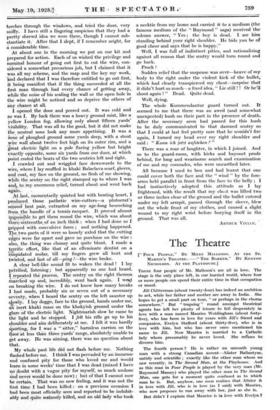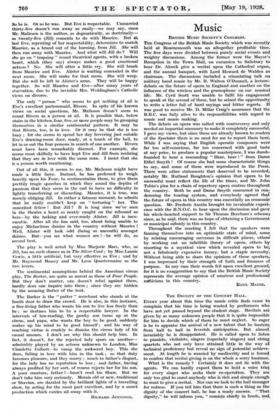The Theatre
[" FOUR PEOPLE." BY MILES MALLESON. AT THE ST.
MARTIN'S THEATRE. " THE BARKER." By KENYON NICHOLSON. AT THE PLAYHOUSE.]
THESE four people 'of Mr. Malleson's are all in love. The stage is the only place left, in our hurried world, where four or more people can spend their entire time in that occupation or mood.
Jill Chitterman (about twenty-four) has indeed an ambition to act, while her father and mother are away in India. She hopes to, get a small part on tour, " or perhaps in the chorus somewhere." But " trapsing " round amongst theatrical agents has left her plenty of leisure to fall desperately in love with a man named Maurice Woldingham (about forty- five), who has been in love for years with Jill's friend and companion, Evelyn Stafford (about thirty-five), who is in love with him, but who has • never once mentioned his name to Jill. Now Maurice is married to a Catholic lady whom presumably he never loved. She refuses to: divorce him.
The fourth' person ? He is rather an uncouth young man with a strong Canadian accent—Alister Ballantyne, untidy and scientific ; exactly like the other man whom we saw recently, in The Second Man, at the Playhouse. And as this man in Four People is played by the very man (Mr. Raymond Massey) who played the other man in The Second Man, one gets for a moment quite confused as to which man he is. But, anyhow, one soon realizes that Alister
in love with Jill, who is in love (as I said) with Maurice, who now proposes to run away with her, just as she is, But didn't I explain that Maurice is in love with Evelyn ?
So he is. Or so he was. But Eve is respectable. Unmarried thirty-five doesn't run away so easily—we may say, since Mr. Malleson is the author, so dogmatically, so doctrinally— as twenty-live (Jill) consents to do with Maurice. But at last Eve, repenting of her respectability, determines to snatch. Maurice, as a brand out of the burning, from Jill. She will then run away with Maurice. And what will Jill do ? Will she go on " trapsing " round theatrical agents, with a broken
heart, which (they say) always makes a good emotional actress ? No. She will utter a little cry. She will break from Maurice and Eve. Alister is waiting concealed in the next room. She will make for that room. She will weep. But she will be left in Mister's arms. They will be happy together. So will Maurice and Eve—after many years of Starvation, due to the invisible Mrs. Woldingham's Catholic views on divorce.
The only " person " who seems to get nothing at all is Eve's excellent parlourmaid, Rivers. In spite of his known views on social questions, Mr. Malleson doesn't seem to count Rivers as a person at all. It is possible that, below stairs in the kitchen, four, five, or more people may be grouping themselves in a similar sentimental pattern. It may be that Rivers, too, is in love. Or it may be that she is too busy ; for she seems to spend her day hovering just outside Eve's drawing-room door, ready, at a touch of the bell, to let in or out the four persons in search of one another. Rivers must have been remarkably discreet. For example, she seems most skilfully to have kept Eve and Jill from realizing that they are in love with the same man. I insist that she is a person worth mentioning.
. Out of all this, it seems to me, Mr. Malleson might have made a little farce. Instead, he has preferred to weigh heavily upon his Four, to sentimentalize them, to give them prettily tragic speeches in which they sound the depths of passions that they seem in the end to have no difficulty in lightly transferring or discarding. Maurice, it is true, was merely obliging Jill. In rather a fatuous moment, he admits that he really couldn't keep on " torturing " her. The conceited fellow ! But Jill ? It is long since we've seen in the theatre a heart so neatly caught on the rebound as hers—by the lurking and ever-ready Alister. Jill is inex- cusable. After all she has said, too, about being unable to enjoy Michaelmas daisies in the country without Maurice ! Well, Alister will look odd (being so uncouth) amongst daisies. But—you see what women are !—he will do, as second best.
The play is well acted by Miss Marjorie Mars, who, as Jill, has no such chance as in The Silver Cord ; by Miss Laurie Cowie, a little artificial, but very effective as Eve ; and by Mr. Raymond Massey and Mr. Leon Quartermaine as the two lovers.
The sentimental assumptions behind the American circus play, The Barker, are quite as unreal as those of Four People. But they don't matter, one doesn't rebel against them, hardly does one inquire into them ; since they are hidden by the amusing, flutter of the tent.
The Barker is the " patter " merchant who stands at the booth door to draw the crowd. He is also, in this instance, a free-living father who wants his son to live less freely than he ; so destines him to be a respectable lawyer. In the intervals of law-reading, the gawky son turns up at the circus, and papa, who wants the boy to be good, suddenly makes up his mind to be good himself ; and his way of reaching virtue is crudely to dismiss the circus lady of his casual amours. I don't see why this should help him. In fact, it doesn't, for the rejected lady spurs on another— admirably played by an actress unknown to London, Miss Claudette Colbert—to vamp the awkward boy. This she does, falling in love with him in the task ; so that duty becomes pleasure, and they marry ; much to father's disgust, for the lady has no reputation to lose ; and father, having always profited by her sort, of course rejects her for his son. A poor creature, father !-hasn't read his Shaw. But we don't take him very seriously. Morals old or new, traditional or Shavian, 'are dazzled by the brilliant lights of a travelling show, by acting for the most part excellent, and by a smart production which carries all away :with- it.
RICHARD JENNINGS.



































 Previous page
Previous page